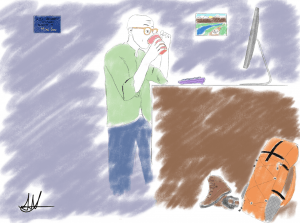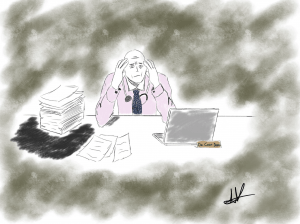Whittled Hope
Abstract
In 2018 the Survey of America’s Physicians Practice Patterns and Perspectives found that 78% of physicians experience feelings of professional burnout, a 4% increase from 2016.[6] Dr. Christina Maslach, a social psychologist at the University of San Francisco describes burnout as “the erosion of the soul caused by a deterioration of one’s values, dignity, spirit, and will.”[5] The burnout results from the depletion of a physician’s physical, emotional, and spiritual energy account. When these energy accounts are depleted, the physician experiences exhaustion, depersonalization, and a lack of efficacy and meaning.[2] These effects can combine to significantly affect physicians’ mental health and can contribute to the development of psychological disorders such as depression and anxiety. This is exacerbated by the expectations that physicians place on themselves. The culture is very work driven and long hours and sleep deprivation are “seen as badges of honor”.[3] As a result, physicians experience greater mental stress than a majority of the population and more work needs to be done to understand their experiences.
The following are a series of vignettes and illustrations meant to describe the experiences of a physician who has burnt out. The drawings were made using Autodesk Sketchbook. The drawings are meant to be sketches and purposefully made roughly, with no boundaries and stray lines. While completely fictional, the overall experience of the protagonist is meant to reflect the thoughts and feelings of a burnt-out physician dealing with psychological stressors associated with burn out. Interviews, memoirs, and other fictional works have been used as inspiration for the construction of the stories. The stories are unique, each with its own set of characters and situations. This is done intentionally to let the reader learn about a broader range of burnout. As the reader moves from the first to the last story, the burnout experienced by each character becomes more extreme. The first vignette will explore burnout from the perspective of a very busy medical student preparing for a big examination. It will go into further detail on how the student feels and how they wish they could be doing a more enjoyable activity. The second vignette tells the story of a doctor who struggles to cope with a patient’s untimely death and blames themselves for the outcome of the operation. The final vignette will investigate the effects of extreme burnout and discusses darker themes such as depression, self-hatred, and suicidal ideations.
The stories are also part of a bigger collaborative project – an Instagram page – @beyondburnout201. The project is done in collaboration with Jenna Diab, Abinav Sankaranthi, and Krishna Chandra. The page, along with my peers’ posts be found through the following link: https://www.instagram.com/beyondburnout201/
Hiking
The alarm blared “Baby” by Justin Bieber as the early morning sun cut through my curtains. I rubbed my eyes open and walked across the room to turn off the awful song. The terrible song and its placement across the room was a method I used to force myself to wake up each day without fail at 6 am. This way I could maximize my ability to work during the assessment week and hopefully perform as best as I could. Once I got changed and ready for the day, I walked over to the kitchen to make a cup of coffee. I saw as I did every day the past couple of weeks, that the sink was full of dirty dishes. Once my exam is done, I’ll get to the dishes, I said to myself. But I had been saying the same thing for weeks. I said it for doing my laundry. I said it for cleaning my living room and taking out the trash. Everything had taken a backseat, there was only one focus in my mind – getting 8 weeks of material memorized by the end of this week.
As I walked back to my room, I saw clothes strewn across the floor and pushed them to the side. I looked woefully at my hiking gear that lay next to my desk. Mike, when was the last time you actually went for a proper hike? I asked myself. Back in my undergraduate days, I would go hiking with my friends every other week. In fact, one of the reasons I chose to come to this medical school was because of all the hiking trails nearby. But, such were the circumstances that I wasn’t willing to go hiking anymore. If I did, I would feel guilty for going out. It just felt like I was wasting precious time that I could have instead spent studying and working on something … productive. Everything I did in the day was to try and optimize my time working on content review.
I opened my Anki flashcard program and started to review anatomy in the respiratory system. But my attention drifted as time went on. There was nothing more that I wanted to do than sleep. My mind was tired and my body felt broken. I looked up at the pictures above my monitor from my most recent hiking trip 2 years ago. Oh, how I would love to be in the mountains again, feeling the icy breeze across my face. I yearned for the clarity and the calm that I would feel in the outdoors. Yet, here I was, working in my apartment all alone standing not with nature but with a screen that I didn’t care for.
My stomach grumbled as I checked the time on my watch. It was already time for lunch and I had only gone through about 50 cards. I took one last look at the pictures and left the room.
Coping
He stood up immediately when he saw me turn the corner and walk into the family room, “Dr. Cody Deen, how is she?” He asked. I took a deep breath, and tried to look him in the eye, but felt ashamed when I did.
“After the ambulance brought her from the crash site, your wife required emergency surgery. The crash shattered many of Natalia’s bones and her broken ribs punctured her lungs.”
The man stared at me in disbelief as I told him the bad news. He held his child close to his chest, who was sleeping peacefully, oblivious to our conversation. “The internal bleeding from the organ damage was uncontrollable and despite our best efforts… we couldn’t save her” I lowered my eyes in shame, and took a deep breath, “I’m sorry.”
He looked away as tears began rolling down his face and put the boy in his stroller. He sat down heavily and held his head in his hands. “If you need anything, please let me or someone on my team know,” I said to him, trying to maintain a comforting voice.
As I turned around and started walking towards my office, I was bombarded with thoughts. Why couldn’t I save her? What will happen to the child, who now has no mother? How could I possibly have let this happen? I opened the door to my office and dragged my feet to my desk and sank into my seat. My many diplomas loomed above my head as if they prepared me for this. I sat heavily on my chair as I grew angrier and frustrated. I realized that the hospital would also have the audacity to exorbitantly charge the man for the procedures we did while trying to save his wife. To make matters worse, I was the one that had to file the procedures and send them over to the administration. Just brilliant. Not only did I just kill the woman but I also got to kick her husband when he was down. She died because I was incompetent.
I looked over to the papers stacked next to me and the computer waiting to be logged in. How could I possibly go on and begin filing the paperwork for the patient? I held my head in my hands, and my eyes became full of tears. I can’t keep losing my patients to my incompetence, I felt so useless. I shook my head in disapproval, closed my eyes, and put my head down on my desk. There was no escape.
Loathing
BEEP! BEEP! BEEP!
I rubbed my eyes as I woke up to the sound of my pager – I was needed in the trauma center again. It was my 3rd consecutive week on call in the ER, and as one of only 4 ER surgeons in the hospital, the onus was on us to make sure that the surgeries went well.
I made my way to the computer to check out the patient’s brief. Natasha Zubareva, a 40-year-old woman with a compound fracture in her arm. Ha, the same old type of case I’ve seen so many times. This was the 4th patient today that had a broken bone. 10 years ago I would have loved it. I would have loved getting up close to patients and performing surgery on them. I would have loved the time I spent doing surgeries, it was why I got into this gig in the first place. But, something changed over the last couple of years. I never felt more empty than when I walked into the OR or when I talked with the patients’ families. The electric environment in the hospital that once mesmerized me had now faded away. Despite the medical knowledge that I had gained over the years, I was now just a shell of what I once was. I was truly a broken man.
The surgery was routine, we saw the patient, cleaned and set the bone, put the patient in a cast, and told them to rest up. Rest. I definitely could use some of that. When was the last time you rested Eugene? I had been so inundated with responsibilities at work, that I couldn’t’ make any time for myself or my family. I could barely spend enough time with my wife and kids. My wife was supportive of my career, but I could tell she was hurting. It was my fault, all my fault. It was me who was putting her through this pain. Maybe I wasn’t meant to be here in the hospital. Maybe… maybe, it was time for me to just end it once and for all. I couldn’t take it anymore.
I got out of the operating room after the procedure and went to the bathroom. I looked at myself in the mirror with disgust. I looked into my eyes with hatred. What have I become? My family doesn’t deserve the pain I’ve put them through. They’ll be better off without me. I can barely support them as it is. I looked down at my hand, wondering what it is I could do to free myself from the pain and the emptiness of my life. I reached into my pocket and pulled out my wallet and my pocket knife. In my wallet was a picture of my wife that I looked at sorrowfully as my eyes filled with tears. I’m sorry Alma. But it is the only way to free me from this pain and this emptiness. Soon, you will be free of me as well. I didn’t even feel human anymore. One stroke of the blade through the jugular would be enough to end it all.
As I raised the cold blade of the knife to my throat, I closed my eyes and held my breath in anticipation of certain death. My heart raced as sweat dripped down the side of my face. The serrated steel pricked my skin as blood started to trickle out. But, something stopped me from continuing. I looked back down at Alma. NO, NO, NO, I can’t do this. I stuffed my blade into my pocket and looked at the photo of my wife again. I pulled out my phone and called her. She picked up immediately.
“Didn’t think you’d be calling at this hour.” She said.
“I love you,” I said to her. I fell to my knees, tears streaming down my face as her picture left my hands and I was consumed by my own darkness, lost and alone.
References:
- Austin, Paul. Something for the Pain: Compassion and Burnout in the ER. New York, NY: W.W. Norton & Co., 2009.
- Drummond, Dike. “Physician Burnout: Its Origin, Symptoms, and Five Main Causes.” Family Practice Management, October 1, 2015. https://www.aafp.org/fpm/2015/0900/p42.html.
- Kalmoe, Molly C, Matthew B Chapman, Jessica A Gold, and Andrea M Giedinghagen. “Physician Suicide: A Call to Action.” Missouri medicine. Journal of the Missouri State Medical Association, 2019. https://www.ncbi.nlm.nih.gov/pmc/articles/PMC6690303/.
- Lim, R., Aarsen, K. V., Gray, S., & Rang, L. (n.d.). Emergency medicine physician burnout and wellness in Canada before COVID19: A national survey. Retrieved December 12, 2020, from https://pubmed.ncbi.nlm.nih.gov/32576321/
- Maslach C, Leiter MP. The Truth About Burnout: How Organizations Cause Personal Stress and What to Do About It. San Francisco: Jossey-Bass; 1997.
- Massachusetts Medical Society, and Harvard School of Public Health. “A Crisis in Healthcare: A Call to Action on Physician Burnout.” MassMed, 2018.
- Shannon, Diane. “Administrative Work Causes Physician Burnout.” Athenahealth, April 5, 2017. https://www.athenahealth.com/knowledge-hub/practice-management/physician-burnout-real-heres-how-fix-it.
- This American Life. (2020, July 27). The Reprieve. Retrieved from https://www.thisamericanlife.org/709/the-reprieve
- Williams, Ian. The Bad Doctor. Oxford (GB): Myriad., 2015
—
Thumbnail:
Bryson Tiller- Exchange (Official Video) [Video file]. (2016, June 1). Retrieved from https://youtu.be/aj9coPGuFkM



